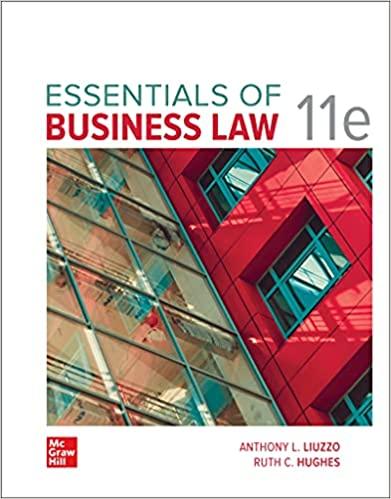Question
Police officers set up a controlled buy of crack cocaine outside an apartment complex in Lexington, Kentucky.Undercover Officer Gibbons watched the deal take place from
Police officers set up a controlled buy of crack cocaine outside an apartment complex in Lexington, Kentucky.Undercover Officer Gibbons watched the deal take place from an unmarked car in a nearby parking lot. After the buy occurred, Gibbons radioed uniformed officers to move in on the suspect. He told the officers that the suspect was moving toward the breezeway of an apartment building, and he urged them to get there quickly before the suspect entered an apartment.In response to the radio alert, the uniformed officers drove into the parking lot, left their vehicles, and ran to the breezeway. As they entered it, they heard a door shut and detected a very strong odor of burnt marijuana. At the end of the breezeway, the officers saw two apartments, one on the left and one on the right; they did not know which apartment the suspect had entered. Gibbons had radioed that the suspect was running to the apartment on the right, but the officers did not hear this statement because they had already left their vehicles. Because they smelled marijuana smoke emanating from the apartment on the left, they approached that apartment's door.
Officer Cobb, one of the officers who approached the door, later testified that they banged on the left apartment door "as loud as [they] could and announced, 'This is the police' or 'Police, police, police.'" Cobb said that "[a]s soon as [the officers] started banging on the door," they "could hear people inside moving," and "[i]t sounded as [though] things were being moved inside the apartment." These noises, Cobb testified, led the officers to believe that drug-related evidence was about to be destroyed. After announcing that they would enter the apartment, the officers kicked in the door and entered. They found three people in the front room: Hollis King (a part-time resident of the apartment); King's girlfriend (to whom the apartment was leased); and a guest who was smoking marijuana. During a protective sweep of the apartment, the officers saw marijuana and powder cocaine in plain view. In a subsequent search, they also discovered crack cocaine, cash, and drug paraphernalia. (Eventually the police also entered the apartment on the right side of the breezeway. Inside that apartment, they found the suspected drug dealer who had been the initial target of their investigation.)
A Kentucky grand jury charged King with trafficking in marijuana and trafficking in a controlled substance. He filed a motion to suppress the evidence discovered in the warrantless search (i.e., to have the evidence excluded from against him), but the trial court denied the motion. King entered a conditional guilty plea under which he reserved the right to appeal the denial of his suppression motion.
Questions are true/false. This is a practice case
1. In the absence of exigent circumstances, the Fourth Amendment permits police searches of homes as long as the search is reasonable and a warrant is issued based on probable cause identifying the scope of the authorized search with particularity.
2. Exigent circumstances permitting the police to search a home without a warrant include rendering assistance to an injured occupant, protecting an occupant from imminent injury, hot pursuit of a fleeing suspect, and recovery of evidence.
3. Even though the police officers loudly yelled "this is the police" and "police, police, police," they did not create the exigent circumstances which caused the occupants to destroy evidence justifying the entry of the police into the apartment and the evidence seized is rendered inadmissible.
4. If the court determines that exigent circumstances existed and the initial search of the apartment was proper (even though the police failed to obtain a warrant), the evidence in plain view after entering the home would nonetheless be admissible against the defendants.
5. Police are not permitted to make a warrantless entry of a home to prevent the destruction of evidence when their loud announcement triggered the destruction of the evidence.
Step by Step Solution
There are 3 Steps involved in it
Step: 1

Get Instant Access to Expert-Tailored Solutions
See step-by-step solutions with expert insights and AI powered tools for academic success
Step: 2

Step: 3

Ace Your Homework with AI
Get the answers you need in no time with our AI-driven, step-by-step assistance
Get Started


